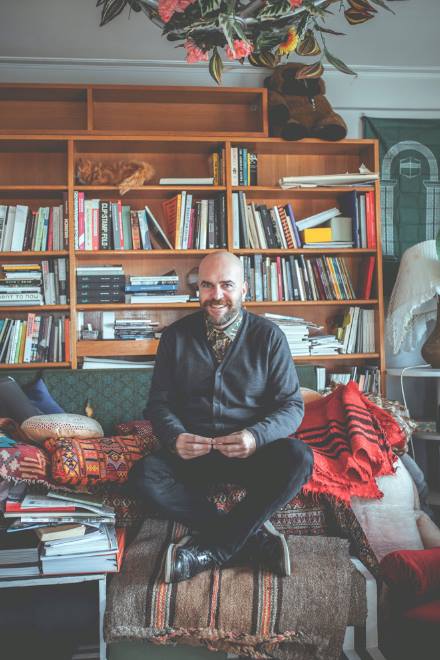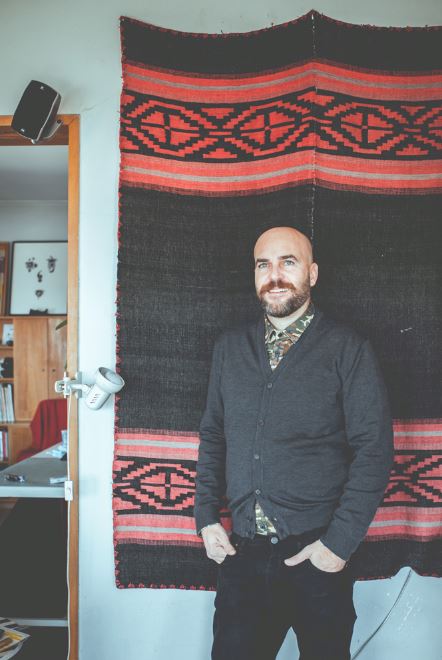Andreas Angelidakis is an architect and an artist. He’s half Norwegian and half Greek and was born in Athens. He started studying at the Aristotle University of Salonika, but realized rather quickly that it wasn’t what he wanted to do. Receiving a scholarship at the age of 21 from the Norwegian state, he started studying at the SciArc school of architecture in Los Angeles. His has been an important journey, filled with unique projects and notable collaborations. Currently, his work, Crash Pad can be found at the 8th Berlin Bienalle.
How did the connection between Crash Pad and the 8th Berlin Bienalle come about?
I was initially approached by Juan Gaitan, the commissary of the 8th Bienalle, in order to design an event space for the some of the groundwork events leading up to the Bienalle. When I presented my idea for Crash Pad, he decided it fit in well with one of the Bienalle’s main themes, that being the creation of national imagery during the 18th and 19th century and opted to present it as a “preliminary statement”.
Why call it Crash Pad and what is the purpose of this space?
The term is used to describe a place where one sleeps when he ends up staying at a friend’s house. And yet it also exists as a term from 70s hippie culture, describing rooms that were covered in fabrics from floor to ceiling and were used for dropping out with LSD and hallucinogens. It was a place to forget and lose yourself in a hallucinatory world.
What do the carpets and collumns of the installation represent? It looks like you’ve created something that looks like a time travelling experience.
The carpets represent the side of Greece left over by the Ottoman Empire, its current reality, as well as that of the 19th century, the time of Theodore Kolokotronis. The columns represent ancient Greece and the attempt to connect that era with the general concept of the “now”, as it was structured by the Renaissance and the Neoclassics. This is virtual Greece. The real and the ideal are the two systems that worked together in creating the modern Greek state, that started way back during the financial bankruptcy of 1893 and stretches all the way to the current financial crisis.
What do you think is the most important aspect in the evolution of Greeks abroad, as well as those who have opted to stay here in Greece?
I can’t say that I can see any tremendous evolutionary progression in Greeks abroad, but I guess I’m not really an expert on the subject, seeing as I’m not really interested in the topic of Hellenism in general. I’m more interested in the idea of Greece as a glitch in Europe’s grand plan. I tend to look at friends who move to London or Berlin or wherever as just modern people, and not Greeks. Cities are just products with their own expiration date, as far as their appeal is concerned. In reality, the feeling they leave you with after you live in them over time changes. It’s not something permanent.
How is your work connected with the financial crisis? What is the deeper meaning that you want to convey through Crash Pad?
The idea was simple and it’s a continuation of the project I started at Feeder, the Breeder gallery in 2010. I took the two systems that collaborated in forming the modern Greek state and made them create a comfortable space. The idea of comfortable is a concept quite far removed from any idea we may have on modern art. A space that is mainly political in its concept, is masked as a comfortable, warm space.
What do you think of Berlin today?
It’s quite different, in the sense that it makes you feel like you’re in many cities at once. There are elements of globalized yuppie culture, underground elements, a sense of dereliction and a sense of something new all at the same time. I can’t say it’s one of the most romantic cities I’ve ever been to, it’s a rather “dry” place. I much prefer Los Angeles, because it feels a lot more like the internet.
Interview: Nelly Skoufatoglou
Photographer: Konstantinos Kartelias








